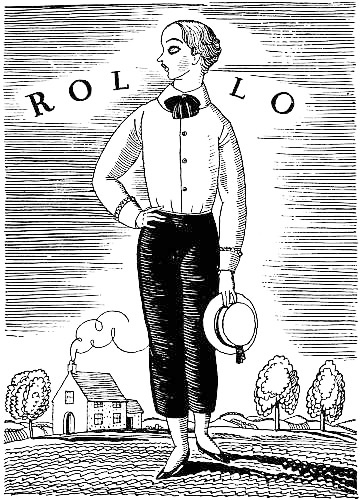
ROLLO IN SOCIETY
A GUIDE FOR YOUTH
BY
GEORGE S. CHAPPELL
EMBELLISHED WITH CUTS BY
WM. HOGARTH, Jr.
A NEW EDITION, REVISED BY THE AUTHOR
G. P. PUTNAM’S SONS
NEW YORK AND LONDON
The Knickerbocker Press
1922
Copyright, 1922
by
George S. Chappell
Made in the United States of America

NOTICE TO PARENTS
Although this little book is primarily intended for the entertainmentof youthful readers, it is hoped by the writer that it may also aid inaccomplishing a number of useful purposes and may prove to be, in thehands of parents, a guide for the modern child through the deviouspaths which his or her feet must inevitably tread.
It is now many years since our little friend Rollo has appearedbetween the covers of a book. Readers of an earlier generation will[Pg iv]recall that Rollo’s environment in their day was that of the farm,the woods, the fields, the brooks, and, at proper intervals and alwaysunder the care of Jonas, the village. Inevitably time has wroughtchanges with these simple elements of our social background and it wasto be expected that Rollo’s family would, at some period, be swept bythe current of events into closer contact with the life of the greatcities which were growing up about them. Thus it is with no surprisethat parents should see the little fellow in situations far removedfrom the woodshed and the hay-barn.
Rollo has much to learn in the [Pg v]City, much of cleverness, ofpoliteness, and of knowledge of seemly behaviour amid surroundings towhich he has been a stranger.
But it is the belief of the author that while Rollo may learn much, hetoo may teach. He, too, brings with him lessons which the writer feelsmay be studied to advantage by both children and adults in the City.Among certain useful purposes they may accomplish the following.
1. A cultivation of the amiable and gentle qualities of the heart.Wherever the scenes of this book are laid, Rollo’s character andconduct described are generally—with the exception of some of theordinary [Pg vi]exhibitions of childish folly—of a kind to be imitated; forit is far better in dealing with children, to allure them to what isright by agreeable pictures of it, than to attempt to drive them to itby repulsive delineations of what is wrong.
2. The instruction, especially of parents, in the temptations towhich childhood is often thoughtlessly exposed, which in the guiseof narrative are here explained and set forth so that the reader maybe both improved and entertained.
3. The imparting of useful rules of conduct by which all ages mayprofit. It will be seen, for instance, how Rollo’s Parents areconstantly [Pg vii]endeavouring to teach him habits of thrift, honesty, andorder. He is urged to take care of his things, his books, his pencils,his toys. Here